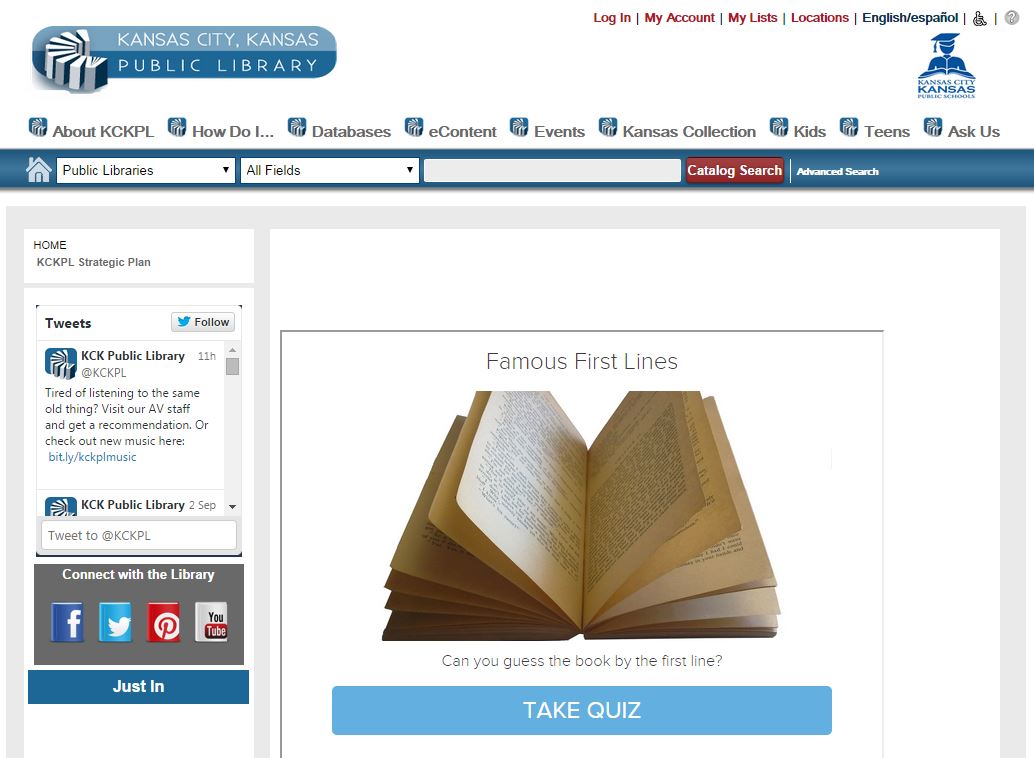5 key elements that distinguish the great online quiz from the ignored
In July 2014, quizzes built using Interact were viewed 1 million times. Of those million views, 90% came from the top 10% of quizzes built. To discover what sets excellent quizzes apart from the rest, we ran some statistics, put together graphs, and delved deep into the psychology of what causes some quizzes to outperform the rest.
What we found is that all the best quizzes have a good degree of similarity, meaning that there IS a formula for the perfect quiz. I'm here today to share that formula with you.
Every great quiz has 5 essential elements that come together to make up the content.
- 1. A title that stands out above social media noise
- 2. A cover image hook
- 3. Conversational questions
- 4. Uplifting and challenging results
- 5. A sharing plan
Let's take a look at each element and the data behind what works.
Step 1: Differentiating yourself with an excellent title
Quizzes receive the most of their traffic from social sites, so the quiz title and a short description are often all you get to see before deciding if you want to click or not. Nearly 80% of your potential quiz takers will decide if they want to click or not based on how you name your quiz!
We found that 75% of the top 100 interact quizzes have titles that fall into one of five categories, here they are.
1. The 'Which (blank) are you?' title: Perhaps the most well-known of quiz titles, this one is extremely versatile and hits on a psychological angle which makes it irresistible to most humans. See, we all like learning about ourselves, and the 'Which (blank) are you?' quiz satisfies that desire.
Titles like 'What kind of operator are you?' have received more than 36k views and sparked conversations across the social web.
 2. The 'actually' title: Turns a normal quiz into a challenge, and we like challenges. For example 'What type of traveler are you actually?' a quiz created by HostelBookers, has received more than 30k views and comments in abundance. This quiz started as a simple personality test, but adding 'actually' changed the feel.
2. The 'actually' title: Turns a normal quiz into a challenge, and we like challenges. For example 'What type of traveler are you actually?' a quiz created by HostelBookers, has received more than 30k views and comments in abundance. This quiz started as a simple personality test, but adding 'actually' changed the feel.
 I know it seems absurd to talk about one word like it changes everything, but in some sense it does, and quizzes with the word actually in the title see a 25% boost in traffic over similar titles without the same word.
I know it seems absurd to talk about one word like it changes everything, but in some sense it does, and quizzes with the word actually in the title see a 25% boost in traffic over similar titles without the same word.
3. The 'Which one?' title: A unique feature of visual quizzes is that they can be used to make true/false quizzes much more fascinating than they should be. For example, a quiz titled 'Spoof diets' asks people to identify if a certain diet is real or fake based on a short description.

The quiz was popular and got mentions from The Guardian, The Telegraph, and several other large publications. Using a quiz to turn a true or false question into something more interactive is an excellent way to drive traffic from social and news sites.
4. The 'How much do you know about?' quiz: Traditional knowledge quizzes were born in the world of schooling, where the quiz was used to benchmark students on their retention of mundane facts.
The modern Buzzfeed style quiz has done away with that stigma and replaced it with titles like 'How much do you really know about world cup soccer?'

In reality this quiz is the same as 'World cup knowledge quiz,' but in our tests we found that the word 'really' being added to a title increased views by 17%.
5. The celebrity comparison title: Celebrities have world-wide recognition. Famous people are put in the spotlight as beacons representing what we could be/who we think we are. People see reflections of themselves in the actions of celebrities. It's only natural that quizzes would compare us to celebrities, and doing so can get you a nice jump in traffic.

The graph above shows average quiz views for titles containing the word celebrity versus titles without the same word. We didn't rule out all the variables like how big the host site was, but in general there is a strong correlation between the word 'celebrity' and getting more quiz views.
Step 2: A cover image hook
As you can see in the quizzes above, quizzes are a hugely visual medium. Every quiz is full of images and appeals to our picture-oriented world. There are two studies that show how and why to use a good cover image in your quiz.
First, tweets with images get 18% more clicks. Images stand out on social media.

Second, quizzes with pictures of one person on their cover photo get significantly more visits.

Step 3: Create conversation in your quiz questions
The most amazing part of online quizzes is their ability to create conversation in a world filled with many-to-one content. What I mean is that articles and videos are entertaining, but they still fail to emulate real-world interaction.
Quizzes on the other hand, allow for the kind of conversation that we experience in our everyday lives, and that's special. Talking with other people is hard-wired into our brains as a positive experience, and even gives us a 'high' feeling.
To find out what kind of effect conversation can have on quiz views, we ran a test. We wanted to see if using personal pronouns like 'I, we, and you' can have an effect on traffic.
We picked those words because studies have shown that 60% of our daily conversations revolve around ourselves, and when we talk about ourselves, we use personal pronouns.
Here's what we discovered.

There is a strong correlation between speaking like you would naturally and getting more quiz views. In other words, talk to your quiz takers like you would to a friend at the bar and you'll come out ahead.
To look at how this plays out in real life, you have to go no further than the Kansas City Public Library, which has been running quizzes on the home page of their site for the last few months.
They do an excellent job of creating quizzes that are conversational and personable. You feel as if the librarian is having talking with you as you answer the questions.
 The library has yet to create a dud quiz, with most of their quizzes getting about 10k views apiece. This is due in large part to the informal and fun style with which their content is written.
The library has yet to create a dud quiz, with most of their quizzes getting about 10k views apiece. This is due in large part to the informal and fun style with which their content is written.
Step 4: Create quiz results that are fun but also lead to next steps
The results of great quizzes do two things. First, they amplify the reach of your quiz through people sharing out their results on social media. Second, they keep quiz takers interested by providing further content for each quiz taker based on their results.
To accomplish the first goal of getting social shares, remain positive. We share things on social media that make us look good (weddings, kids, graduations, etc.) and the same principle applies to every little post.
Making people look good when they share their quiz results means being upbeat in your result descriptions. However, be careful not to overdo it or you'll alienate people who see right through your false positivity.
A general rule is to remain honest, but do everything you can to make the results look good. For example, if you tell someone they are a truck, focus on how strong and reliable trucks are, but avoid talking about how big and cumbersome they can be.
We ran a test to see just how much of an impact being nice can have on social shares of quiz results. To do this, we analyzed 2000 tweets that were sent out from the results of quizzes to see how many had positive trigger words such as 'great, awesome, excellent, etc.)'

The results were overwhelming, a full 3/4 of tweets had trigger words in them. Be kind to people and they will return the favor.
Moving on to the second point where you keep the conversation going with your quiz takers, you want to make sure and provide a link or call to action for every person to keep engaging with your brand even after they finish taking your quiz.
Take a look at this example from Forbes where they provide a personalized link for each quiz taker to learn more about their ideal colleges.

In this picture, the link on the left points to a page that has pre-set parameters based on the result you get for the quiz. That way every experience is as unique as the quiz taker.
Step 5: Have a plan for sharing
The best quizzes can see the future and prepare for it. By that I mean the quiz writers are ready for how the quizzes will appear on social media sites.
In general, quizzes will show up like this when shared: "I got (my result)(title of the quiz)" Take a look at how that plays out.

You want to make sure every quiz result title matches up well with the quiz title itself. Also, the Facebook share will pull your result image, so be sure to make it representative of the quiz.
A summary for the success factors for creating your own quiz
The top quizzes are eerily similar. There is a formula for the perfect quiz, and while there is no way to guarantee your quiz will become as popular as the top quizzes, you can drastically improve your chances by following these tips. Now it's your turn to try it out and make a quiz of your own to get in on the action.
 Thanks to Josh Haynam for sharing his advice and opinions in this post. Josh is the co-founder of Interact, a place for creating fun quizzes that also generate leads. Josh regularly writes about lead generation and conversion rate optimization (CRO). He also enjoys a good game of pickup basketball. Feel free to hit him on Twitter @Jhaynam.
Thanks to Josh Haynam for sharing his advice and opinions in this post. Josh is the co-founder of Interact, a place for creating fun quizzes that also generate leads. Josh regularly writes about lead generation and conversion rate optimization (CRO). He also enjoys a good game of pickup basketball. Feel free to hit him on Twitter @Jhaynam.















 Thanks to Josh Haynam for sharing his advice and opinions in this post. Josh is the co-founder of
Thanks to Josh Haynam for sharing his advice and opinions in this post. Josh is the co-founder of 


